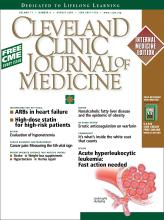ABSTRACT
The large Candesartan in Heart Failure Assessment of Reduction in Mortality and Morbidity (CHARM) trial recently found that in patients with heart failure who were similar to those whom clinicians see in everyday practice, the angiotensin-receptor blocker candesartan was not only an acceptable alternative to angiotensin-converting enzyme (ACE) inhibitors, but also was beneficial when added to regimens that already included ACE inhibitors and beta-blockers. Candesartan was beneficial in heart failure patients with or without left ventricular systolic dysfunction.
Footnotes
↵* The author has indicated that he has received grant or research support from, is a consult for, and is on the speakers’ bureau of the AstraZeneca corporation, the maker of candesartan.
- Copyright © 2004 The Cleveland Clinic Foundation. All Rights Reserved.






